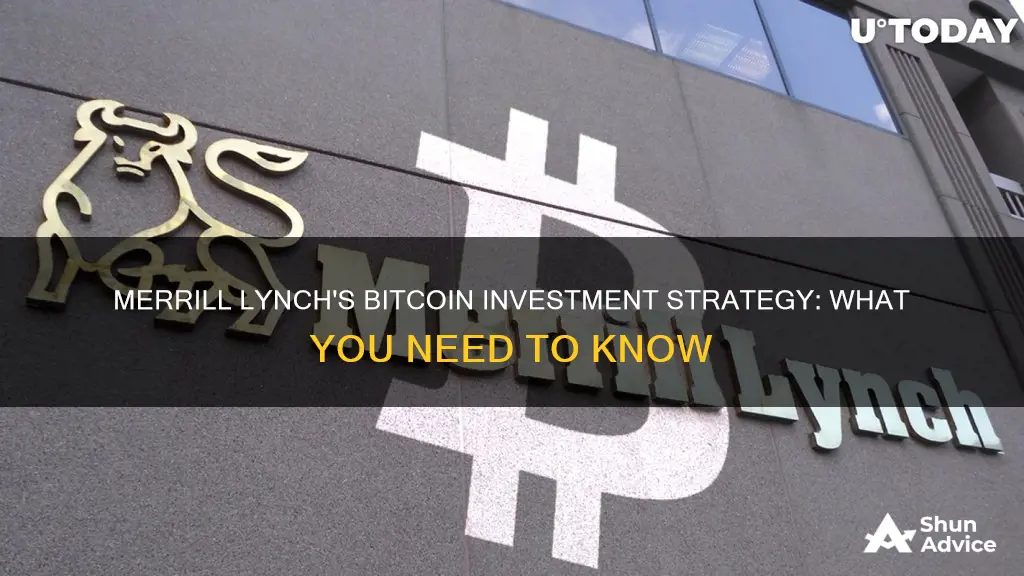
As of February 2024, Bank of America's Merrill Lynch has been offering spot bitcoin exchange-traded funds (ETFs) to eligible wealth management clients. This move comes after the Securities and Exchange Commission's (SEC) landmark approval of such investment vehicles in January 2024. However, in 2018, Merrill Lynch, the brokerage arm of Bank of America, blocked financial advisors and clients from trading in bitcoin-related investments, specifically banning them from investing in the Silbert bitcoin fund.
| Characteristics | Values |
|---|---|
| Merrill Lynch's stance on Bitcoin investment | Merrill Lynch, the brokerage arm of Bank of America, initially banned clients from investing in the Silbert Bitcoin fund in 2018. However, as of February 2024, they are offering spot Bitcoin ETFs to eligible wealth management clients. |
| Bitcoin ETFs | Bitcoin Exchange-Traded Funds (ETFs) allow investors to gain exposure to Bitcoin without directly holding it. |
| Bitcoin's mainstream acceptance | Bitcoin is gaining acceptance by mainstream firms, with major banks like Bank of America and Wells Fargo offering Bitcoin ETFs to their clients. |
| Impact on investors | The availability of Bitcoin ETFs has opened up the asset class to new investors and reignited excitement after the "crypto winter" of 2022. |
| Bitcoin's value prediction | Bernstein analyst Gautam Chhugani predicts that Bitcoin is on an 18-month path to $150,000, driven by institutional adoption. |
What You'll Learn
- Bank of America's Merrill Lynch offers spot bitcoin exchange-traded funds
- Merrill Lynch bans clients from investing in Silbert bitcoin fund
- Bitcoin ETFs are available for unsolicited purchases through Wells Fargo Advisors
- Bank of America Merrill Lynch blocked financial advisers from trading in bitcoin-related investments
- Bitcoin ETFs offer investors exposure to the world's largest cryptocurrency

Bank of America's Merrill Lynch offers spot bitcoin exchange-traded funds
Bank of America's Merrill Lynch has been offering spot bitcoin exchange-traded funds (ETFs) to eligible wealth management clients since February 2024. This move highlights the growing popularity of cryptocurrencies as an asset class. The ETFs provide investors with exposure to Bitcoin without directly holding it, attracting new investors to the market and rekindling excitement after the "crypto winter" of 2022.
Merrill Lynch's decision to offer spot bitcoin ETFs follows the landmark approval of such investment vehicles by the Securities and Exchange Commission (SEC) in January 2024. This approval sparked a wave of interest in cryptocurrencies, with 11 ETFs starting to trade in the United States shortly after. The ETFs have been available to Merrill Lynch clients for several weeks, according to a source familiar with Bank of America's plans.
While Merrill Lynch has taken steps towards embracing cryptocurrencies, it is important to note that the company has not always been receptive to the idea. In 2018, Merrill Lynch banned clients from investing in the Silbert bitcoin fund and blocked financial advisors from trading in bitcoin-related investments. However, with the changing regulatory landscape and increasing institutional adoption, Merrill Lynch has seemingly revised its stance.
The growing acceptance of cryptocurrencies by mainstream firms is underscored by similar moves made by other financial institutions. Wells Fargo, for instance, has also started offering spot bitcoin ETFs to its clients. Additionally, Bloomberg reported that Morgan Stanley might soon offer its clients exposure to similar products.
Holly Willoughby's Bitcoin Investment: Fact or Fiction?
You may want to see also

Merrill Lynch bans clients from investing in Silbert bitcoin fund
Merrill Lynch, the brokerage arm of Bank of America, has banned clients from investing in the Silbert bitcoin fund. This move comes despite the growing popularity of bitcoin and other cryptocurrencies among investors.
In recent years, bitcoin has seen an increase in acceptance by mainstream firms, with some wealth management platforms offering access to bitcoin exchange-traded funds (ETFs). These ETFs allow investors to gain exposure to bitcoin without directly holding the cryptocurrency. In February 2024, Bank of America's Merrill Lynch and Wells Fargo began offering spot bitcoin ETFs to eligible wealth management clients. This development highlighted the increasing adoption of bitcoin as an investment vehicle.
However, Merrill Lynch's decision to ban clients from investing in the Silbert bitcoin fund suggests a more cautious approach to the cryptocurrency market. While the specific reasons for the ban are not publicly known, it is possible that Merrill Lynch has concerns about the volatility and regulatory uncertainty surrounding bitcoin. Indeed, the cryptocurrency market has experienced significant fluctuations, with a crypto winter in 2022 causing prices to collapse.
The ban on investing in the Silbert bitcoin fund may also be influenced by the challenges in assessing the true value of bitcoin. A 2017 research note from Bank of America highlighted the difficulty in determining the investment implications of cryptocurrencies due to their unique characteristics. It is worth noting that Merrill Lynch has not completely prohibited clients from accessing the bitcoin market. The firm has been offering spot bitcoin ETFs to eligible clients, providing a way for investors to gain exposure to bitcoin in a more regulated manner.
Overall, Merrill Lynch's ban on investing in the Silbert bitcoin fund reflects a measured approach to the cryptocurrency market. While recognizing the growing popularity of bitcoin, Merrill Lynch appears to be balancing the potential opportunities with the risks and uncertainties inherent in this emerging asset class.
The Best Cryptocurrency Coins to Invest in Now
You may want to see also

Bitcoin ETFs are available for unsolicited purchases through Wells Fargo Advisors
As of March 2024, Bank of America's Merrill Lynch and Wells Fargo have been offering spot Bitcoin exchange-traded funds (ETFs) to eligible wealth management clients. This move highlights the growing popularity of Bitcoin as an asset class.
Spot Bitcoin ETFs are available for unsolicited purchases through Wells Fargo Advisors or the WellsTrade platform. Wells Fargo Advisors has around 12,000 financial advisors across various business channels. These ETFs have opened up the asset class to new investors and have reignited excitement in the market.
Bitcoin ETFs offer investors exposure to the world's largest cryptocurrency without directly holding it. They can be purchased for as little as the price of one share, plus any trading commissions. As an investor, you are purchasing shares of the overall portfolio, not the actual shares of the underlying investments or index components. However, you are entitled to any dividends or earned interest distributed by the fund.
The growing popularity of Bitcoin ETFs has even prompted some investors to swap out holdings in gold-backed ETFs, as Bitcoin is often touted as "digital gold". The price of Bitcoin surpassed $60,000 in February 2024 and recently broke its all-time high. This surge in value underscores the increasing acceptance of Bitcoin ETFs by mainstream firms.
Edward Jones: Bitcoin Investment Options and Opportunities
You may want to see also

Bank of America Merrill Lynch blocked financial advisers from trading in bitcoin-related investments
On January 4, 2018, Bank of America's brokerage arm, Merrill Lynch, blocked its financial advisers and clients from trading in bitcoin-related investments. This included investments in Grayscale's Bitcoin Investment Trust, a fund led by bitcoin entrepreneur Barry Silbert. According to an internal memo, the decision was driven by concerns about the "suitability and eligibility standards" of the product. The ban was reported to apply to Merrill Lynch's 17,000 advisers, preventing them from suggesting bitcoin-related investments and refusing client requests to trade in bitcoin funds.
This move by Merrill Lynch came as a surprise to some in the industry, as there were no reports of similar bans being implemented by other brokerage firms at the time. Traditional Wall Street banks and brokerages have generally been hesitant to embrace cryptocurrencies, even as major financial institutions began trading bitcoin futures contracts in December 2017. Prior to the launch of the bitcoin futures market, banks like Citigroup and Bank of America blocked clients from investing in bitcoin.
In contrast to this initial wariness, Bank of America, through its Merrill arm, later began offering spot bitcoin exchange-traded funds (ETFs) to eligible wealth management clients in 2024. This shift in approach highlights the growing popularity and acceptance of bitcoin and other cryptocurrencies by mainstream financial institutions. The ETFs offer investors exposure to bitcoin without directly holding the cryptocurrency, providing a new avenue for investment in this asset class.
While Bank of America Merrill Lynch initially took a cautious approach to bitcoin and blocked its financial advisers from related investments, the bank has since evolved its stance and now offers its clients access to bitcoin ETFs. This change reflects the evolving regulatory landscape and the increasing integration of cryptocurrencies into the traditional financial system.
Fidelity's Bitcoin Investment: Exploring the Crypto Opportunity
You may want to see also

Bitcoin ETFs offer investors exposure to the world's largest cryptocurrency
Bitcoin Exchange-Traded Funds (ETFs) are investment vehicles that allow investors to gain exposure to Bitcoin, the world's largest cryptocurrency by market capitalisation, without directly holding it. Bitcoin ETFs provide a more accessible and regulated way for investors to tap into Bitcoin's price movements through their brokerage accounts.
How Bitcoin ETFs Work
Bitcoin ETFs are exchange-traded products (ETPs) that hold Bitcoins in secure digital vaults, managed by registered custodians. These ETFs mirror the price of Bitcoins in the crypto market. The ETFs buy Bitcoins from other holders or through authorised cryptocurrency exchanges, and then store the tokens in digital wallets, often using multiple layers of security, including cold or offline storage to reduce the risk of hacking.
The ETF then issues shares corresponding to the number of Bitcoins it holds. These shares are available on traditional stock exchanges, with their price generally reflecting the prevailing market price of Bitcoin. The shares track the price of Bitcoin as closely as possible, and the ETF occasionally rebalances its holdings by buying or selling tokens.
Benefits of Bitcoin ETFs
Convenience
Bitcoin ETFs lower the barriers to entry into the crypto market, eliminating the need for investors to manage crypto wallets, navigate online exchanges, or deal with private and public keys. This simplifies asset management, making it more attractive to those accustomed to traditional investments.
Liquidity
Bitcoin ETFs make buying and selling Bitcoins easier through familiar brokerage accounts, mirroring the process of trading traditional stocks or ETFs. This provides an intuitive transition for mainstream investors.
Regulatory Oversight
When purchasing Bitcoins directly, investors may lack clear and standardised regulations. In contrast, Bitcoin ETFs are subject to rules that ensure transparency and protect investors.
Tax Implications
In certain jurisdictions, Bitcoin ETFs may offer tax benefits compared to holding cryptocurrencies directly. The tax treatment of ETFs is well-established, providing investors with certainty regarding their tax obligations.
Risks of Bitcoin ETFs
Crypto Volatility
Bitcoin prices are highly volatile, and investors could suffer significant financial losses. While the ETF structure can simplify ownership and storage, it does not shield investors from the inherent risks of the cryptocurrency market.
Regulatory Uncertainty
There is a lack of comprehensive oversight and standards to protect investors from risks such as fraud, manipulation, and loss of assets. Future regulations could impact the performance of Bitcoin ETFs, for example, changes in tax laws could make crypto less attractive for investments.
Security Risks
The large number of coins held by Bitcoin ETFs makes them attractive targets for cybercriminals. While ETF managers employ multilayered security measures, no system is entirely impenetrable. A successful major breach could result in the theft of a significant number of Bitcoins, damaging investor confidence and fund stability.
Management Fees
Bitcoin ETFs charge management fees or expense ratios, which can reduce returns over time. These fees tend to be higher than those of traditional equity ETFs due to the additional costs associated with exchanging and securing Bitcoins.
Bitcoin ETFs offer investors a regulated and simplified way to gain exposure to Bitcoin's price movements. By enhancing liquidity, aiding price discovery, and attracting institutional participation, Bitcoin ETFs could play a pivotal role in stabilising and boosting Bitcoin adoption. However, the increased demand and speculative trading may also lead to concerns about the currency's overvaluation.
Calculating Bitcoin Profits: A Guide to Investment Gains
You may want to see also
Frequently asked questions
No, Merrill Lynch has banned clients from investing in Bitcoin funds.
Yes, Bank of America's Merrill Lynch has been offering spot Bitcoin exchange-traded funds (ETFs) to eligible wealth management clients.
A spot Bitcoin ETF offers investors exposure to Bitcoin without directly holding it.







